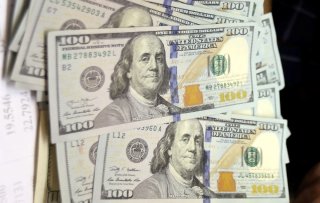Experts Say Up to $80 Billion Stolen from Pandemic Response
The Paycheck Protection Program handed out about $800 billion to American businesses hit by the pandemic, but some of that was lost to fraud.
The Paycheck Protection Program (PPP) was launched by Congress in the early months of the pandemic. The program handed out around $800 billion in relief to American businesses affected by the pandemic.
Now, a new report says that as much as ten percent of those funds may have been stolen.
NBC News reported Thursday that as much as $80 billion may have been pilfered from the PPP program, with recipients spending the money on mansions, luxury cars, private jets, and other such items.
Exactly how much was taken is unclear, and there has been no official government report enumerating the theft. NBC cited “prosecutors, government watchdogs and private experts who are trying to plug the leaks.” The majority of those funds are unrecoverable, experts told NBC News. This is on top of massive money that was fraudulent in other pandemic-era programs, like COVID unemployment and disaster relief programs.
According to the report, the distribution of the funds in 2020 was so focused on speed that the idea of verification took a backseat.
“The Small Business Administration, in sending that money out, basically said to people, ‘Apply and sign and tell us that you're really entitled to the money,’” Michael Horowitz, the Justice Department’s Inspector General and the chair of the Pandemic Response Accountability Committee told NBC News. “And, of course, for fraudsters, that's an invitation. … What didn't happen was even minimal checks to make sure that the money was getting to the right people at the right time.”
NBC also reported that the Pandemic Response Accountability Committee has employed data scientists, to study, to “plow through 150 million records searching for fraud patterns.”
Many businesses fudged how many employees they have, with others applying for PPP money for companies that were created just for that purpose.
Online tech publibication FCW recently looked at the fraud question, and also made clear that it’s hard to know the exact number of how much pandemic aid was awarded improperly.
"We don't have all the data just yet. Secondly, we have lots of cases ongoing and of course there's a difference between an improper payment – of which there's billions and hundreds of billions of dollars – and fraud, and we've got to sort that out through the investigative process," Horowitz said in Congressional testimony this month, FCW reported.
An academic paper published last August asked whether financial tech lenders had facilitated fraud from the PPP program.
The paper, the authors said in the abstract, looks at “potential misreporting including non-registered businesses, multiple businesses at residential addresses, abnormally high implied compensation per employee, and large inconsistencies with jobs reported in another government program.”
Stephen Silver, a technology writer for The National Interest, is a journalist, essayist and film critic, who is also a contributor to The Philadelphia Inquirer, Philly Voice, Philadelphia Weekly, the Jewish Telegraphic Agency, Living Life Fearless, Backstage magazine, Broad Street Review and Splice Today. The co-founder of the Philadelphia Film Critics Circle, Stephen lives in suburban Philadelphia with his wife and two sons. Follow him on Twitter at @StephenSilver.
Image: Reuters.

